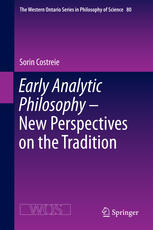

Most ebook files are in PDF format, so you can easily read them using various software such as Foxit Reader or directly on the Google Chrome browser.
Some ebook files are released by publishers in other formats such as .awz, .mobi, .epub, .fb2, etc. You may need to install specific software to read these formats on mobile/PC, such as Calibre.
Please read the tutorial at this link: https://ebookbell.com/faq
We offer FREE conversion to the popular formats you request; however, this may take some time. Therefore, right after payment, please email us, and we will try to provide the service as quickly as possible.
For some exceptional file formats or broken links (if any), please refrain from opening any disputes. Instead, email us first, and we will try to assist within a maximum of 6 hours.
EbookBell Team

4.4
42 reviewsThis volume discusses some crucial ideas of the founders of the analytic philosophy: Gottlob Frege, Bertrand Russell and Ludwig Wittgenstein, or the ‘golden trio’. The book shows how these ‘old’ ideas are still present and influential in the current philosophical debates and to what extent these debates echo the original ideas. The collection aim is twofold: to better understand these fruitful ideas by placing them in the original setting, and to systematically examine these ideas in the context of the current debates animating philosophical discussions today. Divided into five sections, the book first sets the stage and offers a general introduction to the background influences, as well as delimitations of the initial foundational positions. This first section contains two papers dedicated to the discussion of realism and the status of science at that time, followed by two papers that tackle the epistemic status of logical laws. The next three sections constitute the core of the volume, each being dedicated to the most important figures in the early analytic tradition: Frege, Russell, and Wittgenstein. The last section gathers several essays that discuss either the relation between two or more analytic thinkers, or various important concepts such as ‘predicativism’ and ‘arbitrary function’, or the principles of abstraction and non-contradiction.